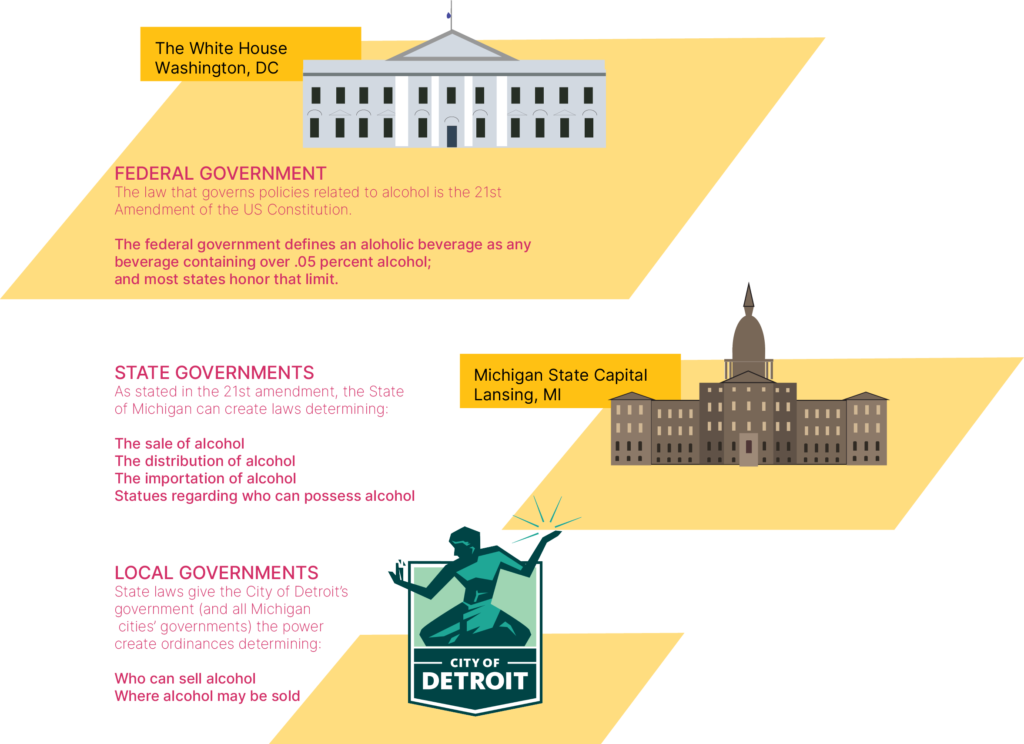The State government controls issuance of liquor licenses
Liquor licenses in Detroit’s Community
Background
At a high, there were 810 liquor stores in Detroit. Over time, the number of liquor stores has declined, still the city has more than 585 liquor stores, gas stations, pharmacies and other small retailers with active liquor licenses. Behind the decline are exorbitant insurance rates, violence, arson, a diminishing population, and severe restrictions on new liquor licenses. Additionally, community activists have been more vocal in recent years about the proliferation of liquor licenses in Detroit’s neighborhoods. For a long time, residents have wanted to see businesses that they think support positivity and provide needed services. They’ve expressed concern about the proximity of liquor stores to communities with children, access to healthy food, as well as the disruptive activities that often surround liquor stores. These neighborhood aspirations may seem to conflict with the city’s development plans, especially in areas that have been baron for years.
The city is anxious to add business where there has been nothing, sometimes not considering community input.
– Eloise Moore, President of Farwell Community Association
Alcohol and Government
Alcohol is governed by a combination of Federal, State, and local laws with the most power on this subject being granted by the Federal government to State and local governments. The Michigan Liquor Control Commission carefully controls alcohol sales through a three-tiered system of:
- licensed suppliers
- wholesalers
- retailers
The MLCC grants a limited number of retail licenses per community, based on population, and reviews all requests for new licenses. The larger the community, the more liquor licenses available. In addition to bars and restaurants, liquor licenses are issued for corner stores, which serve neighborhoods as grocers and are a staple for alcohol, snacks and junk food, cell phones, cigarettes, and the lottery.
Still, the number of liquor stores (and therefore the number of liquor licenses that have been awarded) is four times MLCC’s recommended number. If there are 585 liquor stores in Detroit, the MLCC’s recommendation is that there be no more than 146.


Liquor Stores in Detroit
Since 2014, the number of liquor stores in Detroit has declined by more than 25% according to the Michigan Liquor Control Commission (MLCC). The city of Detroit has an ordinance that an establishment requesting a liquor license cannot be less than 1,000 feet (roughly the length of 3 and half football fields) from another existing business with a liquor license. Request for a variance to this ordinance must be presented to Detroit’s Board of Zoning Appeals (BZA). The seven-member BZA is composed of residents representing each Council district and appointed by their Councilmember. Community groups often appear at the BZA for public comment to advocate against more liquor stores in their neighborhoods.
| What is an Ordinance? A local law passed by a municipal (city) government. Many ordinances deal with maintaining public health and safety. For example, an ordinance may set standards for how high a building can be constructed, or where parking can occur. There is currently, an ordinance that prevents marijuana dispensaries from being opened in “Drug Free Zones” which are defined as within 1,000 feet of a school, church, park, or recreation center. |
City and State Departments Involved
- Michigan Liquor Control Commission
- Planning & Development Department
- Board of Zoning Appeals
- Building Safety and Environmental Engineering Department
Questions
- How do different levels of government interact when establishing liquor sales within communities?
- If a community wanted to have fewer liquor stores, what government interventions would help?
